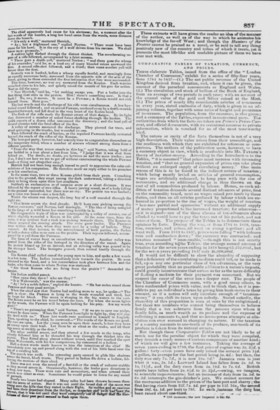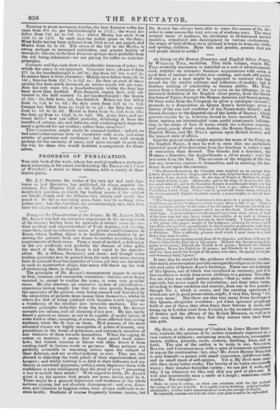COMPARATIVE TABLES OF TAXATION, CURRENCY,
AND PRICES.
THESE elaborate Tables, issued from the office of the " London Chamber of Commerce," exhibit for a series of fifty-four years, from 1784 to 1837—(l.) The net public revenue of the United Kingdom derived from taxation, and, where it can be given, the amount of the parochial assessments or England and Wales.
(2.) The circulation and stock of bullion of the Bank of England, from an average of two periods in each year; with an account of the annual value of the gold and Silver coined at the Mint.
(3.) The prices of nearly fifty considerable articles of commerce in every year, stated exclusive of duty, which is given in an adjoining column, together with some rates of freight and premiums of insurance. The population, from the censuses, is also given; and a summary of the Tables, expressed in centesimal parts. The authorities from which the facts are taken are Prince's Prices Current, and official documents, with an occasional recourse to private information, which is vouched for as of' the most trustworthy The nature or rarity of the facts themselves is not of a very high description. Their value arises from their assemblage, and the readiness with which they are exhibited for reference or comparison. The authors of the publication seem, however, to have a currency object in view, which is resolvable into Mr. TAYLOR.3 theory of taxation-money. According to the Introducti in to the Tables, " it is assumed" that prices must increase with increasing taxation, and " that no general expansion of prices can take place without an enlarged supply of circulating money." One main reason of this is to be found in the indirect nature of taxation ; which being mostly levied on articles of general consumption, wages are artificially enhanced, to keep pace with the rise of necessaries, and an additional charge is thus thrown on the cost of all commodities produced by labour. Hence, as each addition of taxation demands several distinct advances of price, first on the commodity taxed, next on wages raised pro tanto by these duties, and then on all articles produced by labour which are enhanced in proportion to the rise of wages, the weight of taxation " becomes partial and oppressive" without an additional supply of money proportioned to the increased taxation; for otherwise-so it is argued—one of the three classes of tax-advancers above alluded to would have to pay the taNc,; out of his pocket, and not recover them. The purpose of the Tables is to demonstrate these opinions by facts. During tire at, or from 1784 to ISIS. taxation, currency, and prices, all weot on risino. together ; and all went well. From 1819 to 1837, prices were (tiling " with hideous ruin and combustion down ; " the currency was contracted; and taxation remained " immoveable,"—though this is not strictly true, even according tolthe Tables: the average annual amount of taxation for the seven years ending in 181S being 65,232,000i., but for the seven years preceding 1837 only 46,900,0001. It would not be difficult to show the absurdity of supposing that a deficiency of the circulating medium could fall, or be made to fall, upon any one particular class of taxadvancers, or the very great probability that no practicable addition to a nation's imposts, could greatly inconvenience that nation so far as the mere difficulty of flialing a medium for their payment was concerned. But we suspect the cause of the error has a deeper root. The people of the Chamber of Commerce seem, with a good many others, to have confounded prices with value, and to think that, as it is possible to pay an individual's taxes by giving him bank-notes to their amount, so if a nation will only circulate enough of " taxationmoney " it can shift its taxes upon nobody. Stated nakedly, the absurdity of this proposition is seen at once by the enlightened ; but there are numbers who cannot bring themselves to believe firmly that a tax subtracts from the persons upon whom it finally falls, as much wealth as its proluce and the expense of collecting it amounts to, and that no hocus-pocus attempts at alleviation can ever succeed in changing its nature. If the taxation of a country amounts to one-tenth of its produce, one-tenth of its produce is taken from its natural owners. But though these Comparative Tables are not likely to be of much use for the peculiar object for which they were compiled, they furnish a ready means of curious comparison of another kind.; of which we will give a few instances. Takinp-, the average of seven years ending in 1790, the first price of cognac wu 38. 2y/. a gallon : forty-seven years have only raised the naturoi price lid. a gallon, its average for the last period being 3s. 4d.: but then, the duty was only 7s. 7d., it is now 18s. t!d.5 Jamaica rum is just what it was, 3s. ld.; Leeward Island has fallen from 2.s. 5d. to Is. 1id., and the duty risen from 4s. 10d. to is. 6d. British spirits have fallen from 2s. 81d. to 2s. 2id.,—owing, we imagine, to scientific improvements; but an increase of duty from '14. 5d. to 6s. 3d. intercepts the gin-drinker's joys. We cannot account for the enormous addition to the prices of the best port and sherry ; the • first baring risen from 2U. 7:. 4d. per pipe to 51/. 16s., the second front 281. 4s. Id. per butt to 76/. In each ;instance the duty has been raised about one-third.
• UM measure ; the new Imperial is Ott far.
Turning to more necessary articles, the best Jamaica coffee has risen from 87/. Gs. per hundredweight to 112/.; the worst has fallen from 79/. 5s. to 70/. 2s.; whilst Mocha has sunk from 199/. Is. to 117/. In each case the public gains on the duty ; West India having been reduced from low. to 6d. per pound, and Mocha from 2s. to 9d. The cause of the fall in the Mocha, is owing perhaps to increased cultivation, and greater facility of transport: the rise in the best Jamaica springs most probably from the soil being exhausted-we are paying for coffee on corn-law principles.
Currants and figs each show a considerable increase of price: for which the cause is not apparent. Currants have advanced from 27/. Is. the hundredweight to 401.9s.; figs from 30/. 10s. to 53/. 2.s. In raisins there is little alteration : Malaga have fallen from 18/. to 161.; Smyrna from 23/. 7s. to 22/. 48.: the duty on each of these articles has been much increased, on raisins nearly 100 per cent. Rice has only risen 12s. a hundredweight, whilst the duty has been more than doubled. Fine Jamaica sugars have only advanced in the half century is. per hundredweight ; the brown I/. 12s.: the duty here, too, has doubled. Bohea tea has fallen from Is. 9sld. to Is. 8d.; the duty risen from Sid. to Is. ind. Congou has fallen from 4s. I 1d. to 3s. id.; the duty has risen from Is. Id. to 2s. 6d. Hyson is down from 98. 24d. to 5s. id.; the duty up from Is. I ltd. to 3s. 8id. Oh, glory, wars, and national debts! how you afflict posterity, debarring it from the benefits of science, art, and industry, and rendering each improvement a godsend for our creditors rather than ourselves !
This comparison might easily be pursued further : indeed, we had noted some curious facts in connexion with coals, and some articles of provision and condiment ; but we have said enough perhaps for the curiosity of many, and quite enough to point out the way for those who would institute a comparison for themselves.



























 Previous page
Previous page